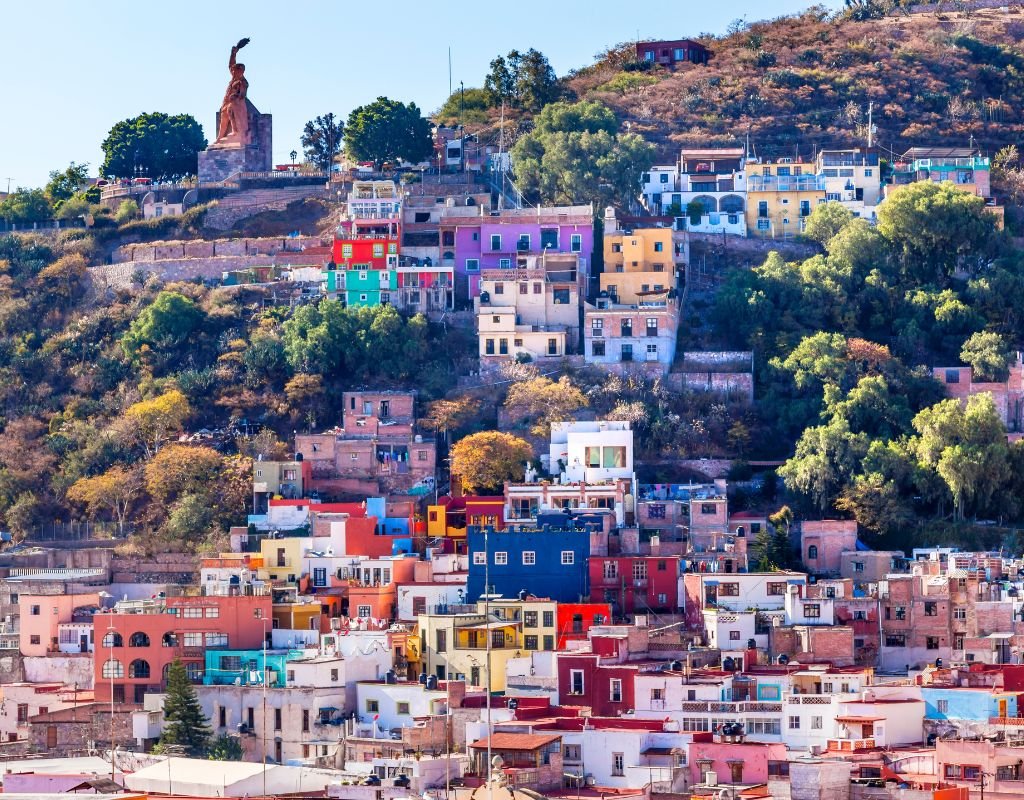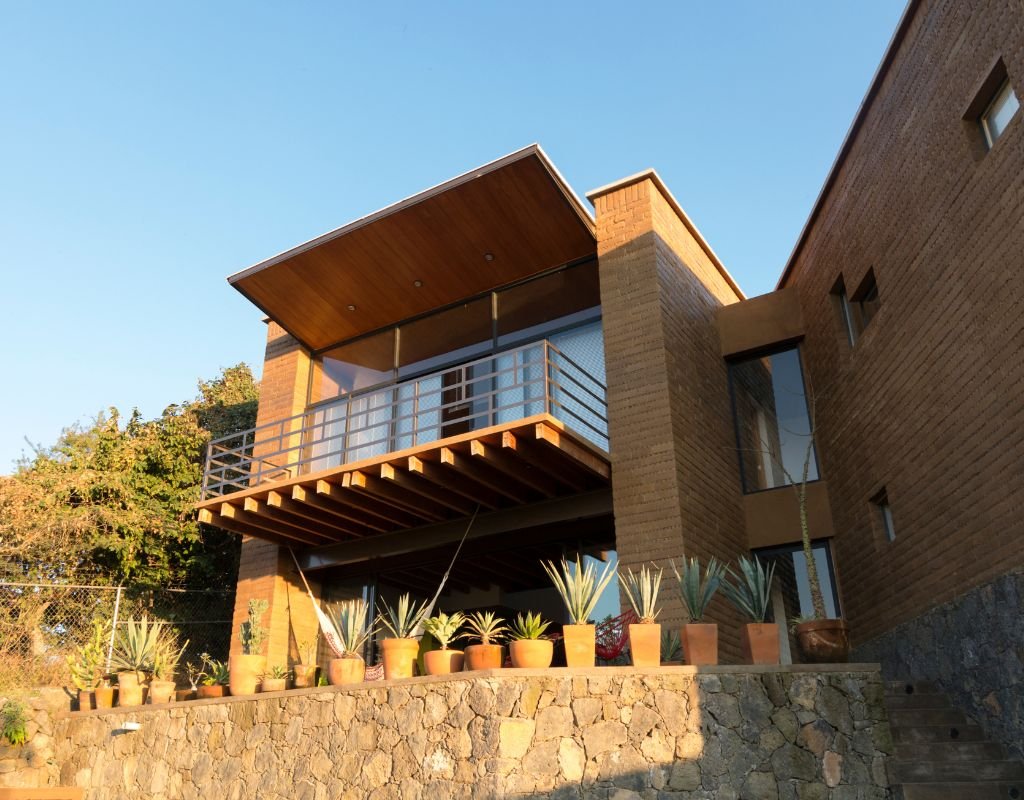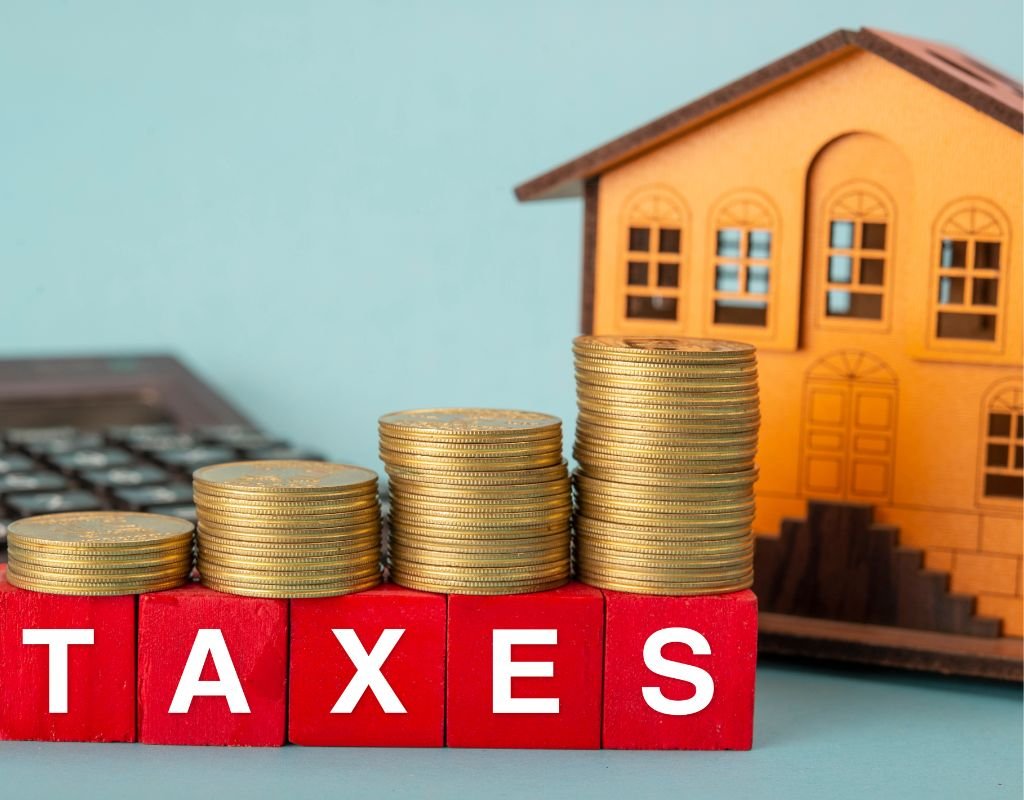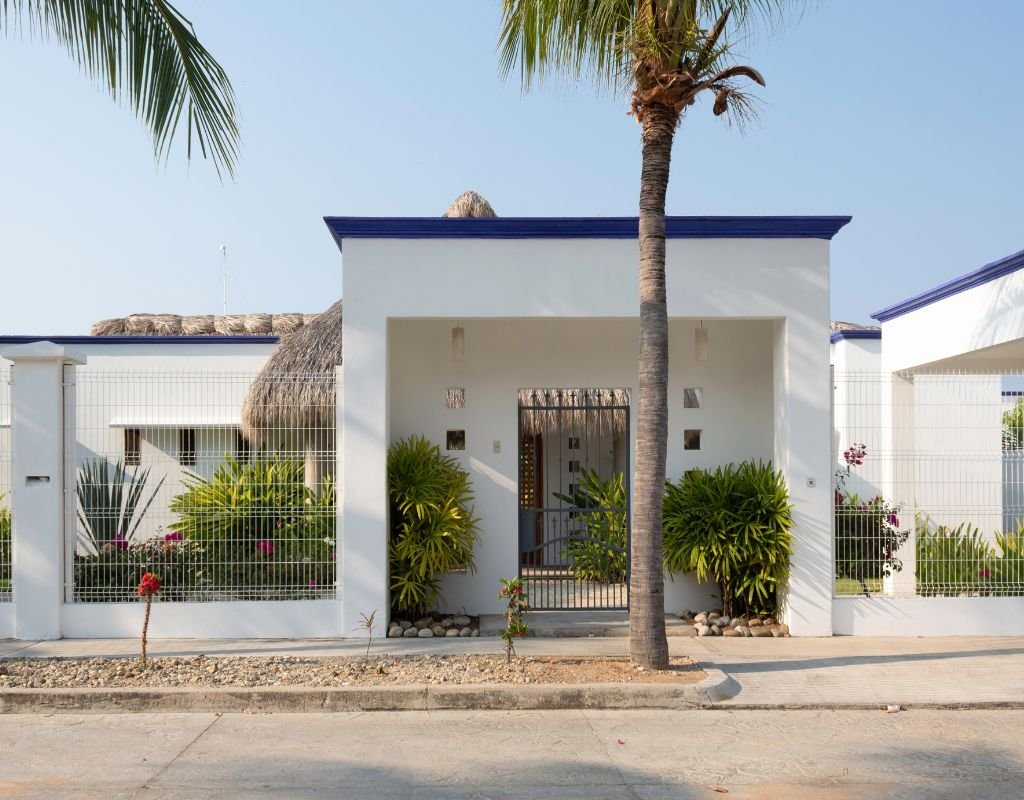The Complete Guide to Buying a Home in Mexico as a Foreigner
|
Thinking about buying a home in Mexico? You’re not alone!
Mexico has become a popular choice for many Americans looking to move abroad. I’ve moved to Mexico with my family several times for extended periods, and through trial and error, I’ve learned a lot about the red tape and bureaucracy involved. From navigating property laws to understanding the hidden fees, there’s a lot to consider when buying or even renting a home in Mexico.
One of the best things about living in Mexico is the excellent quality of life it offers – the warm weather, delicious food, and friendly people make it an appealing place to call home. Plus, the cost of living can be much lower than in the U.S., making it an attractive option for retirees, digital nomads, and families alike. Especially if you choose to live in a safe community in Mexico.
It is however important to be aware that the real estate market in Mexico operates differently from what you might be used to in the U.S. If you don’t know the ins and outs, you could easily fall into a trap and overpay, buy a property with legal issues, or worse—fall victim to a scam.
That’s where this guide comes in! With the right information and guidance, buying a home in Mexico can be an exciting and rewarding experience. In this guide, we’ll walk you through every step of the process, from understanding property prices and taxes to avoiding scams and making sure you have all the necessary documents.
Whether you’re looking to invest, retire, or start a new adventure, this guide will help you make informed decisions and feel confident about your purchase.

Step by Step Guide to Buying a Home in Mexico as a Foreigner
Buying a home in Mexico as a foreigner is an exciting adventure, but it does come with its own set of steps and considerations. Here’s a straightforward guide to help you navigate the process:
1. Research and Decide on Location
First things first, figure out where in Mexico you’d like to buy. Whether it’s the vibrant life of Mexico City, the beaches of Cancun, or the cultural charm of San Miguel de Allende, each area has its own vibe and price range. Spend some time visiting different places to see what feels right for you.
2. Understand Ownership Restrictions
Mexico has specific rules for foreign property ownership, especially in what’s called the “Restricted Zone.” This includes areas within 50 kilometers (about 31 miles) of the coastline and 100 kilometers (about 62 miles) of the borders. In these zones, foreigners can’t own property outright but can do so through a fideicomiso, which is a bank trust. Outside these areas, you can own property directly.
3. Hire a Reputable Real Estate Agent
Once you’ve chosen a location, find a trustworthy real estate agent who knows the local market and has experience working with foreign buyers. They’ll help you find properties that match your needs and guide you through the buying process.
4. Hire a Qualified Lawyer
If you ignore everything else on this list, and only do this one thing, you’ll already be ahead of the game! It’s really important to hire a local attorney to help with legal matters, like reviewing contracts and ensuring the property has a clear title. They’ll make sure everything is above board and protect your interests.
5. Make an Offer and Sign a Sales Contract
When you find a property you like, you’ll make an offer, usually through your agent. If the seller agrees, you’ll both sign a sales contract (known as a contrato de compraventa), outlining the terms of the sale, including price and any conditions. At this point, you’ll typically pay a deposit, often around 5% to 10% of the purchase price.

6. Set Up a Fideicomiso (If Needed)
If the property is in the Restricted Zone, you’ll need to set up a fideicomiso. This involves a Mexican bank holding the title in trust for you, allowing you to use, rent, or sell the property as you wish. Your attorney and notary will help arrange this.
7. Get Permission from the Foreign Affairs Ministry
Foreign buyers must get permission from Mexico’s Foreign Affairs Ministry (Secretaría de Relaciones Exteriores) to purchase property. This is usually handled by your notary.
8. Conduct Due Diligence
Your notary and attorney will verify that the property’s title is clear, check for any debts or liens, and confirm that all property taxes have been paid. They’ll also ensure the property complies with zoning and environmental regulations.
9. Finalize the Purchase
Once everything checks out, you’ll sign the final deed (known as the escritura) in front of a notary, pay the remaining balance, and cover any closing costs, which typically include notary fees, registration fees, and taxes. The notary will then register the property in your name with the Public Registry.
10. Pay Ongoing Taxes and Fees
As a property owner in Mexico, you’ll be responsible for ongoing expenses like property taxes (known as predial), maintenance fees, and any trust fees if you have a fideicomiso. Property taxes in Mexico are generally low, averaging around 0.1% of the property’s assessed value.

Average House Prices in Mexico
Exploring the Mexican real estate market offers a variety of options to suit different lifestyles and budgets. Below is a chart highlighting ten cities, their approximate property prices per square meter in Mexican pesos, and what makes each city a desirable place to live.
Because property prices can fluctuate, make sure to consult current listings or local real estate agents for the most accurate information. Here’s a chart with approximate property prices listed in Mexican Pesos (MXN) per square meter to give you an idea of prices in January of 2025:
| City | Approximate Price per Square Meter (MXN) | Highlights |
| Mexico City | $47,600 – $51,000 | Vibrant cultural scene, diverse neighborhoods, and numerous amenities. |
| Cancún | $42,500 – $45,900 | Beautiful beaches, thriving tourism industry, and lively nightlife. |
| Guadalajara | $20,400 – $25,500 | Rich history, mariachi music, and tequila culture. |
| Monterrey | $20,400 – $25,500 | Strong industrial economy, modern infrastructure, and proximity to the U.S. border. |
| Mérida | $17,000 – $20,400 | Colonial architecture, safe environment, and close to Mayan ruins. |
| Puebla | $17,000 – $20,400 | Historic city center, culinary traditions, and affordable living. |
| Querétaro | $17,000 – $20,400 | Growing tech industry, well-preserved colonial areas, and family-friendly atmosphere. |
| Tulum | $42,500 – $45,900 | Bohemian vibe, eco-friendly developments, and stunning beaches. |
| Playa del Carmen | $42,500 – $45,900 | Resort town feel, vibrant expat community, and beautiful coastline. |
| San Miguel de Allende | $25,500 – $30,600 | Artistic community, charming cobblestone streets, and UNESCO World Heritage status. |

Purchasing Fees
Here are the fees you’ll come across when buying property in Mexico, their descriptions, and who is typically responsible for paying them:
| Fee Name | Description | Who Pays It? |
| Notary Fees | Charged by the notary public for overseeing the legal aspects of the property transfer, including drafting and authenticating the deed. These fees are usually a percentage of the property’s value. | Buyer |
| Registration Fees | Fees for registering the property transfer with the Public Registry, ensuring legal recognition of ownership. Rates vary by state, generally between 0.5% to 1% of the property value. | Buyer |
| Appraisal Fees | Costs associated with determining the property’s market value, which may be required for tax purposes or financing. This fee is typically a flat rate or a small percentage of the property’s value. | Buyer |
| Bank Trust (Fideicomiso) Fees | Applicable if the property is within the restricted zone (e.g., near coastlines or borders). Includes setup fees (around US$1,000) and annual maintenance fees (approximately US$500 to US$2,000). | Buyer |
| Foreign National Permit | Permit fee for foreign buyers to acquire property in Mexico, required by the Ministry of Foreign Affairs. | Buyer |
| Title Search and Insurance | Fees for conducting a thorough title search to ensure the property is free of liens, and for obtaining title insurance to protect against future disputes. Costs vary based on property value and provider. | Buyer |
| Real Estate Agent Commission | Fee charged by the real estate agent for facilitating the sale, typically ranging from 5% to 8% of the property’s selling price. This is usually paid by the seller but can sometimes be negotiated. | Seller |
Having a knowledgeable real estate agent and lawyer can help clarify the costs associated with your property purchase in Mexico.

Homeowner Taxes in Mexico
Here’s a breakdown of common taxes, their descriptions, and who is typically responsible for paying them:
| Tax Name | Description | Who Pays It? |
| Transfer Tax (ISAI) | This is a tax you pay when you buy a property in Mexico. The rate varies by state, usually between 2% and 5% of the property’s value. | Buyer |
| Inheritance Tax | Good news—Mexico doesn’t impose an inheritance tax on properties passed down to heirs. However, it’s wise to consult with a local attorney to understand any related legal requirements. | N/A |
| Property Tax (Predial) | This is an annual tax based on your property’s assessed value. Rates are generally low, often between 0.1% and 0.5%, depending on the municipality. Paying early in the year can sometimes get you a discount. | Owner |
| Rental Income Tax (ISR) | If you rent out your property, the income is subject to Mexican income tax. Rates are progressive, ranging from 0% to 35%, depending on your total income. Non-residents might face different rates, and ISR taxes can become a tax credit in the US, to avoid double taxation, so it’s worth talking with an accountant about this. | Owner |
| Capital Gains Tax (ISR) | When you sell your property, you might owe capital gains tax on the profit. The tax is calculated based on the difference between the purchase price and the selling price, after adjusting for inflation. Certain exemptions may apply, especially if the property was your primary residence. | Seller |
🔴 Watch out❗ If you don’t declare your rental income or any other taxable income in Mexico, you could face some serious consequences. The Mexican tax authorities, known as SAT (Servicio de Administración Tributaria), have been tightening their regulations in recent years, especially when it comes to foreigners who own property.
If you’re caught not reporting your income, you might have to pay hefty fines, back taxes, and even face legal action. In extreme cases, the government could freeze your Mexican bank accounts or put a lien on your property.

Best Places to Buy a Home in Mexico
Mexico has a lot to offer when it comes to real estate, whether you’re looking for a beachside escape, a bustling city life, or a peaceful colonial town. From the Yucatán Peninsula to the Pacific coast, there’s a perfect spot for every budget and lifestyle. Some areas are known for their affordability, while others offer luxury living with high appreciation potential.
Below is a quick look at some of the best places to buy a home in Mexico, their average price per square meter, and why they might be the right fit for you. You’ll want to focus on the best cities for expats in Mexico.
| Place | Approximate Price per Square Meter (MXN) | Why Buy Here? |
| Mexico City | $47,600 – $60,000 | A bustling metropolis with world-class restaurants, cultural attractions, and a thriving job market. |
| Cancún | $42,500 – $65,900 | Stunning beaches, warm weather year-round, and a booming tourism industry make it a great investment. |
| Guadalajara | $28,400 – $55,500 | A cultural hotspot with rich history, great food, and a lower cost of living compared to Mexico City. |
| Monterrey | $25,400 – $55,500 | Strong economy, modern infrastructure, and a growing expat community make it ideal for professionals. |
| Mérida | $21,000 – $40,400 | Colonial charm, safety, and affordability make it a top pick for retirees and expats. |
| Puebla | $17,000 – $29,400 | Known for its beautiful architecture, rich cuisine, and relatively low cost of living. |
| Querétaro | $17,000 – $27,400 | A fast-growing city with a mix of modern and colonial charm, plus a strong job market. |
| Tulum | $42,500 – $62,900 | Boho vibes, eco-friendly developments, and breathtaking beaches make it a favorite for investors. |
| Playa del Carmen | $42,500 – $75,900 | A laid-back beach town with great expat communities and investment opportunities. |
| San Miguel de Allende | $35,500 – $40,600 | A charming colonial town with a thriving art scene and a strong expat presence. |

Can foreigners own a home in Mexico?
The short answer is yes! Mexico welcomes foreign buyers, and many expats own property across the country. However, there are some restrictions you need to be aware of, especially if you’re looking to buy near the coast or the border.
The Restricted Zone
Mexico’s constitution prohibits foreign ownership of property within 50 kilometers (about 31 miles) of the coastline and 100 kilometers (about 62 miles) from international borders. But you can still legally purchase property in these areas through a fideicomiso mentioned in the steps above. This is a bank trust that allows foreigners to control and benefit from the property while the bank holds the title.
Here’s how it works:
- A Mexican bank holds the title to the property on your behalf.
- You have full control to rent, sell, or renovate the property as you like.
- The fideicomiso is valid for 50 years and can be renewed indefinitely.
- It typically costs around $1,000 USD to set up, with annual fees between $500 and $2,000 USD.
If you’re buying property outside the restricted zone, you can own it directly, just like a Mexican citizen, with no need for a bank trust.
What About Owning Through a Mexican Corporation?
Another option for foreign buyers looking to purchase multiple properties or invest in commercial real estate is setting up a Mexican corporation. This allows foreigners to own property in restricted areas without a fideicomiso, but it comes with more paperwork and, obviously, more taxes.

Can a foreigner get a mortgage in Mexico?
Wondering about financing options? The good news is that foreigners can obtain mortgages in Mexico. However, the process and requirements can differ from what you might be used to back home.
Mortgage Options for Foreigners:
🏦 Mexican Banks: Some Mexican banks offer mortgages to foreigners, typically requiring you to have Permanent Resident (Residente Permanente) status. These loans often cover up to 70% of the property’s appraised value, meaning you’ll need a 30% down payment. Interest rates can be higher than in the U.S. or Canada, often ranging from 7% to 12%.
🏦 Cross-Border Mortgages: Certain U.S. banks and private lenders specialize in cross-border financing, offering loans in U.S. dollars for purchasing property in Mexico. These lenders might have more flexible terms and could be a good option if you prefer dealing with a U.S.-based institution.
🏦 Developer Financing: If you’re buying a property from a developer, especially in pre-construction phases, they might offer financing options. Terms vary, but this can be a convenient way to finance your purchase without going through a traditional bank.
🔴 Hot Tip: Interest rates in Mexico are generally higher than in the U.S. or Canada. If you have assets or equity in your home country, consider exploring financing options there, such as a home equity line of credit, to potentially secure a lower interest rate.

Do I need a lawyer when buying a house in Mexico?
Yes, you should absolutely hire a lawyer when buying a home in Mexico. While it’s not legally required, this is not the place to skimp! The Mexican real estate system operates differently from what you might be used to in the U.S. or Canada, and having a lawyer on your side will definitely keep you out of trouble.
Why You Need a Lawyer
Buying property in Mexico involves a lot of paperwork, and a lawyer can help you to:
How to Find a Good Real Estate Lawyer
Here are a few tips to help you find a reliable lawyer:
💼 Choose an English-speaking lawyer – Even if you’re fluent in Spanish, and unless you trained as a lawyer, you’ll need someone to translate all that legalese.
💼 Look for experience in real estate – Make sure the lawyer specializes in property transactions and has good reviews from other foreign buyers.
💼 Ask for recommendations – Getting a recommendation from expat forums, social media groups, and local real estate agents for lawyer referrals, is better than from friends in my experience.
💼 Check their credentials – Make sure they are registered with the Mexican Bar Association and have proper credentials.
🔴 Hot Tip: Please don’t rely solely on the seller’s lawyer or the real estate agent to handle your sale—they work for the seller, not you! Hiring your own independent lawyer is the best way to protect yourself.
How long can I stay if I’m buying a home in Mexico?
Buying a home in Mexico doesn’t automatically give you residency, but it can help when applying for a long-term visa, especially if you’re planning on moving to Mexico. Here are your main options:
📑 Tourist Visa (FMM): Allows stays up to 180 days, but doesn’t permit work. You’ll need to leave and re-enter to extend your stay, but immigration is getting stricter about renewals.
📑 Temporary Resident Visa: Ideal if you want to stay longer than 6 months. Usually valid for 1 year, renewable up to 4 years, and requires proof of income. Owning property can support your application.
📑 Permanent Resident Visa: Great for long-term stays with no renewal needed. It’s harder to qualify for, with higher financial requirements, but allows full residency rights.
Property ownership helps with visa applications but doesn’t guarantee residency—work with an immigration expert to find the best option for your situation.

Avoiding Real Estate Scams and Other Risks
There are lots of pros and cons to buying a home in Mexico. Scams and red tape are just some of the issues to look out for. Here’s a rundown of common issues and how to avoid them:
🚫 Title and Ownership Issues
One of the biggest risks is purchasing a property without a clear title, which means there could be disputes over who actually owns it. This can lead to legal headaches down the road.
✅ How to Avoid this: Always conduct a thorough title search. Your lawyer should verify that the property has a clear title and is free from liens or disputes.
🚫 Ejido Land Confusion
Ejido land is communal land owned by local communities and isn’t typically available for private ownership. Buying ejido land can result in losing your investment if the sale isn’t handled properly.
✅ How to Avoid this: Steer clear of ejido land unless you’re well-versed in Mexican agrarian law and have a good lawyer. Also make sure any property you’re looking at is fully privatized.
🚫 Skipping Professional Inspections
Neglecting a proper property inspection can be very expensive in repairs.
✅ How to Avoid this: Always hire a qualified inspector to assess the property’s condition before finalizing the purchase.
🚫 Misunderstanding the Fideicomiso
Foreigners buying property within 50 km of the coast or 100 km of international borders need a fideicomiso (bank trust) to hold the property. Misunderstanding this will cause legal issues.
✅ How to Avoid: Familiarize yourself with the fideicomiso process and work with a good lawyer who can guide you through it.
🚫 Falling for Scams
Unfortunately, real estate scams do happen, including sellers misrepresenting properties or selling without proper authority.
✅ How to Avoid this: Work with licensed real estate agents and a lawyer. Be wary of deals that seem too good to be true, and always verify the credentials of those you’re dealing with.

🚫 Overlooking Additional Costs
Focusing solely on the purchase price can lead to surprises when extra costs arise.
✅ How to Avoid this: Make sure to budget for closing fees, property taxes, maintenance fees, and any other expenses before you dive in.
🚫 Financing Challenges
Securing financing in Mexico can be more complex for foreigners, with stricter lending criteria and higher interest rates.
✅ How to Avoid this: Explore financing options in your home country or consider paying in cash if possible. Some developers also offer financing plans.
🚫 Ignoring Local Legal Requirements
Each region in Mexico has its own regulations, so make sure to get a lawyer who’s in the know to avoid fines or legal issues.
✅ How to Avoid this: Get a good lawyer from the area you’ve decided to buy in.
🚫 Language Barriers
Not understanding Spanish can lead to miscommunications and misunderstandings during the buying process.
✅ How to Avoid this: Hire bilingual professionals! Even when you speak Spanish fluently, legalese is a very different vocabulary which you’ll need a lawyer for, so don’t go without.
🚫 Overlooking Homeowners Association (HOA) Rules
Some properties, especially in gated communities, come with HOA rules that may be restrictive.
✅ How to Avoid this: Review HOA regulations thoroughly to make sure they align with your lifestyle and you’re not planning on doing anything against the communal rules.
The common thread here is to get a good lawyer! Do not skip this important step!

What are the documents needed for buying property in Mexico?
When you’re gearing up to buy property in Mexico, having the right paperwork in order is crucial. Here’s a breakdown of the key documents you’ll need:
📎 Valid Passport: Your current passport serves as your primary identification.
📎 Mexican Visa: While not always mandatory for the purchase itself, having a valid visa can be beneficial, especially if you plan to stay long-term.
📎 Sales Contract (Contrato de Compraventa): This agreement outlines the terms of the sale between you and the seller.
📎 Property Deed (Escritura Pública): The official document proving ownership, which is formalized by a notary public.
📎 Proof of No Liens (Certificado de Libertad de Gravamen): A certificate confirming the property is free from debts or legal issues.
📎 Property Appraisal (Avalúo): An official valuation of the property, often required for tax purposes.
📎 Tax Receipts (Recibos de Impuestos): Evidence that property taxes and utilities are paid up to date.
📎 Foreign Affairs Permit (Permiso de la Secretaría de Relaciones Exteriores): If you’re buying within restricted zones (like coastal areas), you’ll need this permit.
📎 Fideicomiso Trust Agreement: For properties in restricted zones, this is the trust agreement with a Mexican bank allowing foreign ownership.
📎 Proof of Funds: Documentation showing you have the financial means to complete the purchase.

Tips for Negotiating in Mexico
Negotiating when buying a home in Mexico can be quite different from what you’re used to in the U.S. or Canada. Sellers often expect some back-and-forth, and knowing how to handle the process can save you a good amount of money. Here are some useful tips to help you get the best deal:
💰 Do Your Homework
Before making an offer, research the local market to understand typical prices in the area. Check similar properties and talk to expats or local real estate agents to get a sense of what’s reasonable.
Hot Tip: Don’t rely solely on online listings—prices are often negotiable!
💰 Start Lower Than Your Budget
It’s common practice to start with an offer 10-20% below the asking price. Many sellers list their properties higher, expecting buyers to negotiate. But don’t go too low and risk offending the seller!
💰 Cash is King
If you can pay in cash (or at least offer a large down payment), you might have more negotiating power. Sellers often prefer buyers who can close quickly without waiting for financing approvals.
💰 Be Patient
Negotiations in Mexico can take time. Unlike in some countries where deals close quickly, property transactions here often involve lengthy discussions and approvals. Stay patient and be ready for counteroffers.
💰 Inspect First, Negotiate Later
If your inspection reveals any needed repairs, use this as a bargaining tool. Ask for a lower price or request the seller to fix major issues before closing the deal.
💰 Work with a Local Expert
A good local real estate agent or lawyer can provide valuable insight into cultural norms and fair pricing. They’ll also help navigate the process and ensure you’re not overpaying.
💰 Negotiate Closing Costs
Some fees, like notary fees or transfer taxes, can sometimes be split between buyer and seller. Be sure to ask about these costs upfront and see if there’s room for negotiation.
💰 Be Ready to Walk Away
If the seller isn’t budging and you’re not happy with the terms, don’t be afraid to walk away. There are plenty of properties available, and patience can often lead to a better deal.
Hot Tip: In Mexico, relationships matter. Building rapport with the seller and being respectful can go a long way in getting a better deal.

Buying a house in Mexico: The Wrap-Up
While the process comes with its own unique challenges—like understanding legal requirements, taxes, and potential risks—being well-prepared can help you avoid expensive mistakes and make the experience a whole lot better..
By following the right steps, working with trustworthy professionals, and staying informed about the local market, you can confidently navigate the process and find the perfect place to call home in Mexico.With careful planning buying a home in Mexico can be one of the best decisions you’ll ever make. So, take your time, do your research, and enjoy the journey of finding your dream home in this incredible country!
Hello and Welcome!

We started our family travel blog in hopes of supporting other families move abroad and travel the world. Through straightforward, sincere and supportive information we hope to provide a reliable guide for those moving overseas with a family and traveling the globe.





